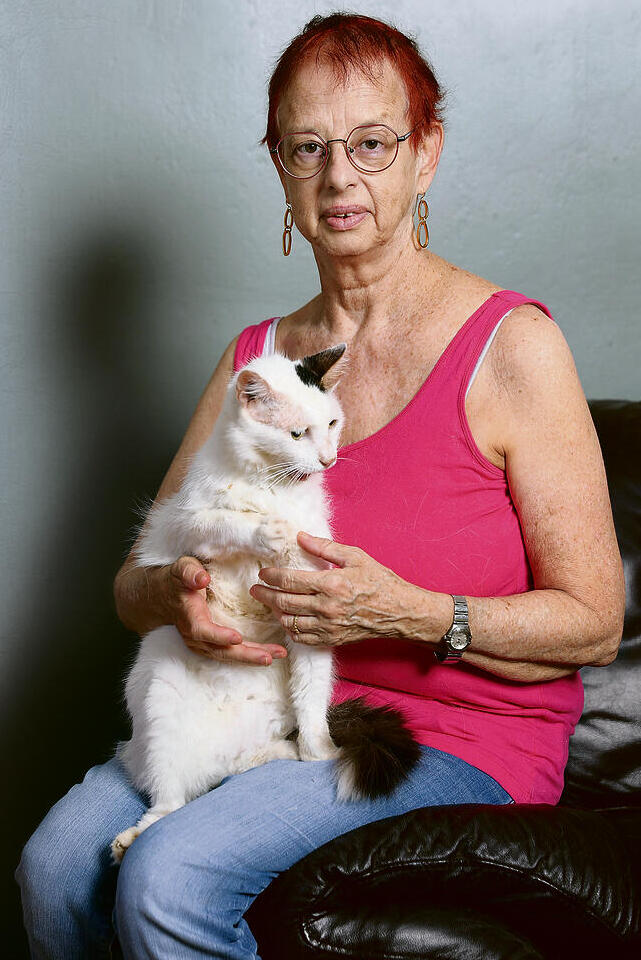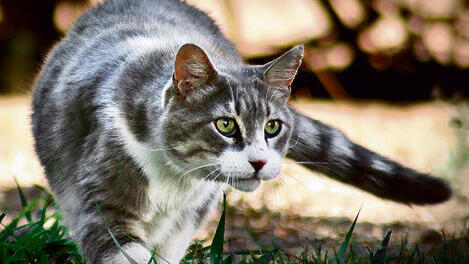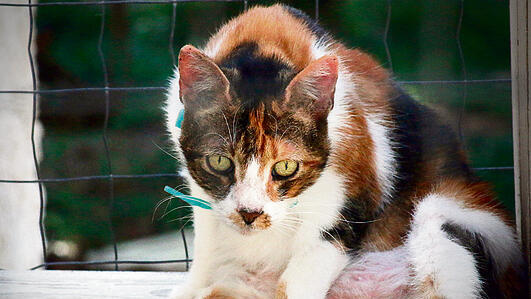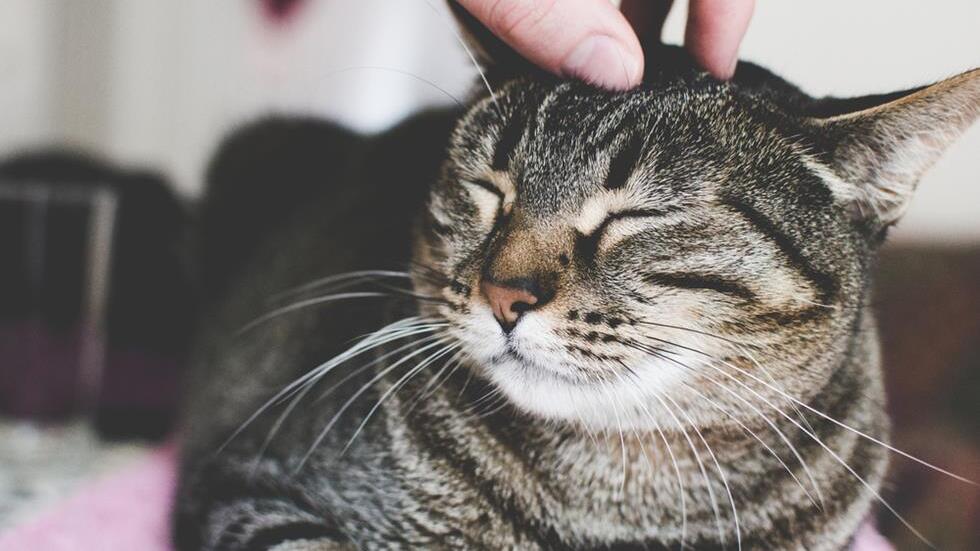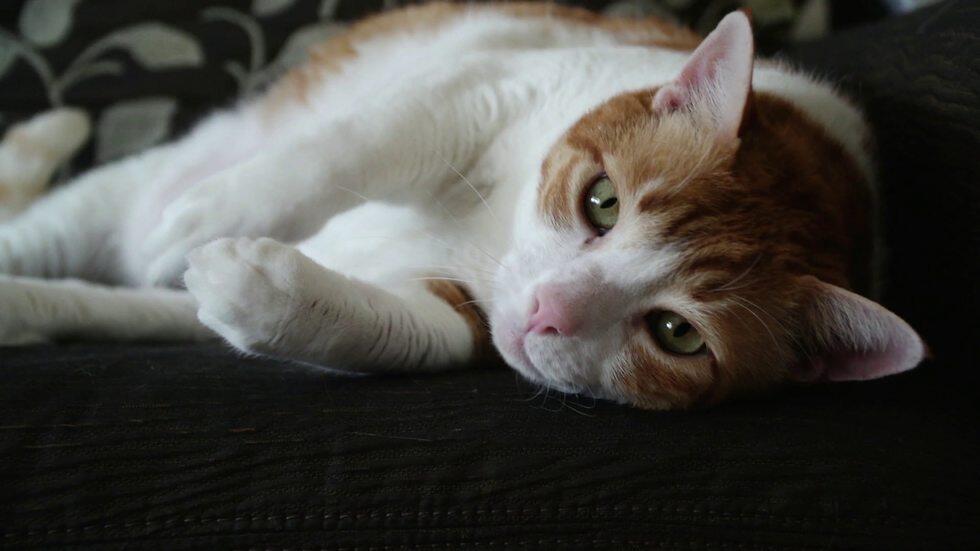Hundreds of thousands of cats owe their lives to one woman, Rivi Mayer, who 30 years ago put all her vast wealth into founding an animal shelter known as “The Cat Welfare Society of Israel”.
She organized an appeal to the Supreme Court, resulting in cats in Israel being officially declared a protected animal, and replacing poisoning with spaying and neutering. With her life partner, Rini Amiran, Mayer founded 2FOR CATS, the center for cat experts. The two have also written a cat guidebook, called “Cats - A World of Love”.
Last month, Rivi underwent an intricate operation to remove a cancerous growth from her pancreas. The cancer diagnosis left Mayer, 61, destitute.
The daughter of the late Mordechai Mayer who built the Shalom Tower, Israel’s first skyscraper, has now turned to crowdfund to help cover the debt accrued since the diagnosis. The target sum of 150,000 NIS ($44,000) - which is a long way off - will also be used for the daily feeding of 100 cats. “They rely on me. If we stop buying ten bags of dry food a month, each costing 150 NIS ($44), the cats will likely meet their ends.”
Do you mean street cats?
“Delete that! It’s an antiquated term. In the good old days, when I used to go to conferences, I brought some new vocabulary to Israel. In Europe and the United States, they now call them ‘community cats,' because that’s what they are. Cats that don’t have homes are part of our surroundings, our life, our environment. I’m a great believer in the strength of community. For years, I gave all I had to cats in Israel. I now find myself asking for the very thing I had been asking for the cats – a little compassion.”
How does the daughter of Mordechai Meir, who in the 1960s ranked as a leader of Israel’s private sector, go broke?
“I’m the youngest child. I was born long after my three brothers. My father was 48 and my mother, Rivka, was 40. It was very unusual at the time. We lived in Bat Yam, in a house with a swimming pool, a tennis court and lots of cats and dogs. My father, suffering from Alzheimer’s Disease towards the end of his life, made a series of financial mistakes. We weren’t disinherited, but the four of us received very modest sums in the will. Most of the property was passed to the descendants of my father’s brother, Moshe.”
But your father was a public figure, one of the founders of Tel Aviv
“The year I was born, they laid the foundation stone for the Shalom Tower. The inauguration took place when I was five. People called it ‘Kolbo Shalom’ (the Shalom Department Store) as it was Israel’s first department store. My father always called it ‘The Tower’ and people called me ‘The Tower Girl’. It was an economic center, hosting lots of events, the suicides making headlines. I remember my father would come home and say ‘today, I saw another one fly past my window, on his way down.’ Jumping off the roof was very 'in' until they put up a fence.”
And the fortune?
“The money ran out a long time ago. I set up the foundation with money out of my own pocket. I never drew a salary, but rather I funded the foundation. I even sold my home in Ramot Hashavim to try to save the foundation because it was not making any money. This saved a million community cats from being poisoned to death. I’m not sorry, but I have no assets, and certainly no surplus.”
When setting up the foundation, Mayer was in a relationship with a man and a new mom. She was also able to hire a young married mother of two, Rini Amiran, to work for her.
“Cats are my life. When I saw the foundation was looking for new employees, it was a dream come true. We started working together and we witnessed the most horrific abuse of cats, showcasing the worst side of mankind. There were beautiful moments too: We were always happy when anyone came to adopt a cat and asked for advice,” Rini recounts.
“It's different today,” says Mayer. “In Europe and America, cats have overtaken dogs as the number one pe.. what’s the word?’’ Her partner tries to help out, “pets,” he says. Mayer, annoyed by the term, adds, “God forbid. A pet’s like a toy. The professional term is 'companion animal' - affirming just how important animals are in our lives. When I was having my hellish nine rounds of chemotherapy, I had with me two cats, Emil and Ginger. Emil didn’t leave my side for a moment. “
They were with you in the hospital?
“Regretfully, that’s not allowed. Some of the chemo I had here at home, and Emil would lay on me. I was his pillow. He was cuddling me. He’s eight and he’s been with us since he was born. His mother and her three newborn kittens were brought to us. The plan was to find them homes, but as always, they stayed with us: Emil, Betty and Jerry.” With great effort, she stoops down: “Emile. where are you? Let’s tell the journalist about Shrimpy.”
Shrimpy?
“That’s what we call my cancer. It’s small – only four centimeters long. I went through hell with the chemo and it didn’t get any smaller, so they operated. They said it would be hard and complicated. I don’t believe in dreams. Fighting cancer isn’t my style.”
Mayer continues to explain her wordplay on the Hebrew word "Sartan," which is used for both “cancer” and “crab”. Because I come from a place of love and compassion, I invented “Shrimpy” - a little crab that I embrace, gradually leading him to the sea where he belongs.”
A 20-year love story
In an interview I conducted with Rini and Rivi 13 years ago, they told me how their work had yielded a love story. Rivi tells us: “We were good friends and we mainly talked about the cats. Even after we went home, we carried on talking about work and the cats on the phone. We had a lot of emotional barriers. I’m sure people observing us could see what we were in denial.”
One evening, after work, Rini invited Rivi to a café and they could both feel the tension in the air. They each went back home and assessed their current relationships. Rivi was the first to break. On the evening of Rosh Hashana 20 years ago, she wrote a romantic letter to Rini, who as a result realized that she was at a crossroads. “We’d moved very slowly, but I realized we’d reached the point-of-no-return. If I chose to carry on living with my husband, I’d lose Rivi, which was unthinkable. I told my husband the truth, that I was in love with Rivi. He’s a wonderful, sensitive man and he accepted it.”
I’m in their rented home on Moshav Sde Warburg. Seven years ago, they left their rented apartment in central Tel Aviv for the open green spaces, allowing the cats to frolic freely. Helping Rivi sit down, Rini explains that “the cats are definitely kings in our house.” Rivi also dyes red the fresh plumage following the chemotherapy-induced hair loss.
How many cats are in there in the house?
“It’s like my mother Rivka, who loved animals, used to say, 'Not one and not two.' There are 35 cats around the house, but we feed over 100 cats a day. We have our set spots in Shikun Dan and Ramot Hashavim as well as another two spots here in the moshav.
"During the COVID lockdowns, every journey was a challenge. The vets issued transit passes for 'angels,' but the police at every roadblock treated us like criminals. We once got a 5000 NIS ($1500) fine for breaching lockdown. In the end, they canceled it. There are pro bono lawyers at 'Noah,' a foundation dealing with animal welfare organizations who address special cases.”
Sixteen years ago, when Mayer ran out of funds, "The Cat Welfare Society of Israel" closed its doors. Rivi isn’t coy about what it achieved: “I did something, 30 years ago when I started working to enhance cat welfare, people were feeding cats in secret. They were afraid of the neighbors. The foundation created awareness regarding community cats, bringing cat lovers out of the closet. Feeding cats is trendy now. A lot of young people are into it. Online, there are pages of tens of thousands of 'feeders’ exchanging information, creating a whole social scene. Some people put out leftovers. Others regularly buy bags of cat food. There are also plenty of elderly people who, although struggling financially themselves, never miss a day feeding the cats. It’s beyond kindhearted. It’s ultraistic. Some people simply can’t bear watching a living creature suffer.”
But you can’t live on love, you need money
“This is true. Until COVID, we supported ourselves by guiding and advising cat owners. We also opened a long-term cat kennel. It didn’t make us rich, but we got by.”
Mayer started feeling unwell a year ago. “I had stomach aches. I felt weak. I went to my family doctor who said that pains that come and go are no cause for concern. A month later the pain returned. In hindsight, the doctors say that I didn’t give the impression of being seriously ill. My stomach hurt, but I wasn’t in horrific pain – and COVID was in full swing. I was given an X-ray appointment six months later. I kept asking for a referral for an ultrasound test. The moment the technician began the test, I see the results by the look on her face. She identified something suspicious and called in a doctor. I was quickly sent to Sheba hospital. I had a biopsy – and there it was - a cancerous growth in my pancreas.”
How did you react?
“At first, I felt like it was the end of the world. Then I thought ‘OK. What do we do?’ The protocol is six months of chemo, radiation, then an operation. They removed my spleen and duodenum, a large part of the pancreas, and also 36 lymph nodes. The good news is that the tumor was entirely removed and there are no metastases. Now, to finish up, they want to give me three more rounds of chemo."
How do you feel now after the operation?
“Since the operation, I’ve lost my appetite. I’ve shed ten kilograms (22lbs), I’m very weak. I have side effects from the chemo - a tingling sensation in my fingers and toes, and I keep falling asleep. The hardest part is that sometimes I can’t take care of the cats. They’re the love of my life. Although I’m certified 100% handicapped, I haven’t received any benefits at all from the National Insurance. We’re not good at bureaucracy. I need a volunteer for that too. We took bank loans and time is soldiering on. Almost all of our cats are over the age of ten. Who’ll take them? The house cats are old – they’ve lost their teeth and they can’t chew the dry food. We give them tinned food – another few hundred shekels each month.”
How are you so optimistic?
“I’m strong and I’ll get through this. The most important thing is to pay off the debt so that in a month or two when I’m physically stronger, I can launch into my next mission.”
She already knows what that mission is: “I’ve neglected the community cats in recent years because I didn’t have any money. The first thing Rini told me when I woke up from the operation was that a rich lady from San Diego came to Tel Aviv, saw the community cats around her hotel, and wants to see what she can do to help them.
"We’ve had a few Zoom calls and I’ve started writing a program for clinics to spay and neuter cats. This is the only way to stop them from breeding. Right now, there’s a million community cats in Israel, many unsterilized. Who’s going to take care of them? Me!”
To donate to Rivi's crowdfund, click here>>>


